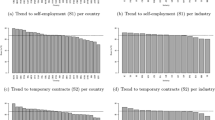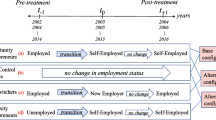Abstract
This paper measures and decomposes the differences in earnings distributions between public sector and private sector employees in Germany for the years 1984–2001. Oaxaca decomposition results suggest that conditional wages are higher in the public sector for women but lower for men. Using the quantile regression decomposition technique proposed by Machado and Mata (2004), we find that the conditional distribution of wages is more compressed in the public sector. At the low end of wages, differences in characteristics explain less than the raw wage gap when it is the opposite at high wages. Separate analyses by work experience and educational groups reveal that the most experienced employees and those with basic schooling do best in the public sector. All these results are stable over the 80s and 90s.
Similar content being viewed by others
Author information
Authors and Affiliations
Corresponding author
Additional information
I thank Michael Lechner and the Centre for European Economic Research (ZEW), Mannheim, for letting me work with the full sample of the German Socio-Economic Panel (GSOEP). I am grateful to an anonymous referee and particularly to the editor, Bernd Fitzenberger, for providing me detail comments and suggestions that have significantly improved the paper. I have also benefited from discussions with Michael Lechner and Ruth Miquel.
First version received: April 2002/Final version received: June 2004
Rights and permissions
About this article
Cite this article
Melly, B. Public-private sector wage differentials in Germany: Evidence from quantile regression. Empirical Economics 30, 505–520 (2005). https://doi.org/10.1007/s00181-005-0251-y
Issue Date:
DOI: https://doi.org/10.1007/s00181-005-0251-y




